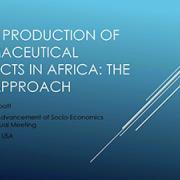
Presentation at the 2014 Annual Meeting of the
Society for the Advancement of Socio-Economics (SASE)
Abstract:
The WHO Global Strategy and Plan of Action mandated the Director General to support transfer of technology and local production of medicines in developing countries. This paper briefly lays out the conditions for local production in Africa and describes the on-going work program of the WHO Department of Public Health, Innovation, Intellectual Property and Trade (PHI) directed at supporting local production efforts. Encouragement of local production is not without controversy as governments must weigh their interest in pursuing the potential holistic benefits of security of supply, support for research and training, manufacturing employment and balance of payments improvements, with assuring that supplies are purchased at prices competitive with global lowest-priced supplies of assured quality. Ultimately, for local production efforts to be successful medicines must be provided at prices competitive with, and of comparable quality to, imported products. The African Union and national governments within Africa are promoting local production, and are working with the support of a number of multilateral organizations including UNIDO, UNCTAD, UNAIDS and WHO, with increasing interest of the African Development Bank. There is considerable attention both from local investors and multinational industry, and there are opportunities for technology leapfrogging. From the WHO perspective, the key element is to focus attention on the promotion of public health objectives, including through the strengthening of regulatory capacity. The author is consultant adviser to WHO PHI.
Frederick M. Abbott | Chicago, Illinois, US July 11, 2014
